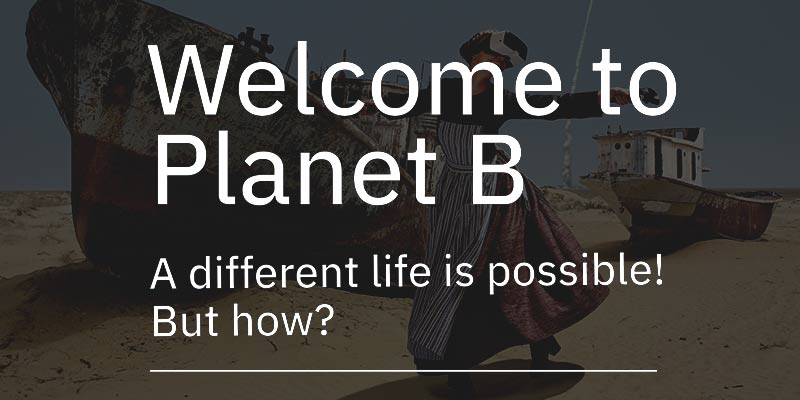forinnovators

Zukunft von Arbeit und Freizeit in nachhaltigen Ökonomien
Shalini Randeria (US), Craig Calhoun (US), Andrea Vetter (DE)
Dieses Panel befasst sich mit Fragen rund um die Zukunft von Arbeit und Freizeit im grünen Kapitalismus im globalen Norden und globalen Süden und reflektiert die Rolle von Universitäten und kulturellen Institutionen bei diesen Übergängen zu neuen Arbeits- und Freizeitmustern. Welchen Beitrag könnten neue Technologien leisten, um die Art von Veränderungen zu bewirken oder zu verhindern, die Sie sich vorstellen?

Journey S+T+ARTS Exhibition
Karla Spiluttini (AT)
Karla Spiluttini (AT) präsentiert die STARTS-Prize-Projekte des Jahres. Im Mittelpunkt stehen Best Practice Ansätze für verantwortungsvolle Innovation in den Bereichen Ökologie, künstliche Intelligenz, digitales Eigentum, Politikgestaltung sowie Kommunikations- und Medientechnologien.
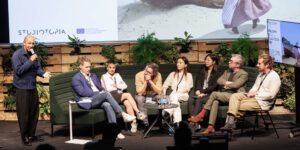
GET.Inspired by Best Practice
Bradly Dunn Klerks (NL/BE), Arisa Kamada (JP), Christoph Pasching (AT), Fara Peluso (IT/DE), Jakob Lambert (AT), Marko Vivoda (SI), Yinan Liu (NZ), Michael John Gorman (IE)
Get.Inspired Talks beleuchten vielversprechende, praxisnahe Projekte im Spannungsfeld von Kunst, Technologie und Wissenschaft die der Leitfrage “But How?” nachgehen und Wege aus der planetaren Krise beschreiben.

Residency. But How?
Christian Rauch (DE), Aimee Van Wynsberghe (CA), Irakli Sabekia (GE), Marjan Žitnik (HR), Robertina Šebjanič (SI)
Residencies bieten Künstler*innen und Wissenschaftler*innen die Möglichkeit, ihren jeweiligen Blickwinkel zu wechseln - von der Arbeit in einem Atelier zur Erprobung ihrer Fähigkeiten in einem Laborkontext und umgekehrt - und fördern so den Austausch von Ideen und die Entwicklung neuer konzeptioneller Modelle zur Problemlösung.

Dataspace: Global impacts of the Russian war on Ukraine
Nikkei Innovation Lab (JP), Ars Electronica Futurelab (AT)
Dataspace proposes a "newspaper of the future": Here, the Ars Electronica Futurelab and financial newspaper Nikkei's Innovation Lab demonstrate, how art and journalism can help to listen carefully to facts and think deeply rather than just consuming and reacting to news.

Space Ink Experience Workshop
Wacom Co., Ltd., Ars Electronica Futurelab (AT)
In the Space Ink workshop, visitors can draw with light: Using Wacom pens and tablets, you control luminescent drones to draw in three-dimensional space via the Ars Electronica Futurelab's operating system SwarmOS.
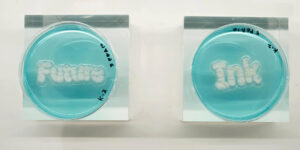
Bio Ink Experience Workshop
Wacom Co., Ltd., Yoko Shimizu (JP)
In the Bio Ink workshop, visitors draw and write with microorganisms: living ink! The data from Wacom pens and tablets is digitally extracted while the artworks morph into beautiful patterns in a new ecosystem of creativity.
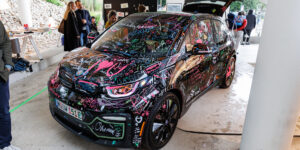
Mobility of the Future Workshop
Supersense x BMW Experience Lab Project, Bernhard Böhm (AT), Ars Electronica Futurelab (AT)
The focus is on the question of mobility experiences on planet B. On September 8 and 9, visitors are invited to the workshop "Mobility of the Future" with sociologist Bernhard Böhm (AT) to exchange ideas and develop visions.
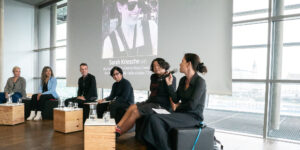
Media of the Future
Nicolas Naveau (FR/AT), Rashin Fahandej (US/IR), Sarah Kriesche (AT), Oishi Nobuyuki (JP), Joanna Wright (GB), Takeshi Yamada (JP)
In this age of visual information inundated with text and images, what are new methods and media for thinking deeply about facts and issues rather than simply consuming and reacting to news? The "Media of the Future" session will focus on Artistic Journalism.
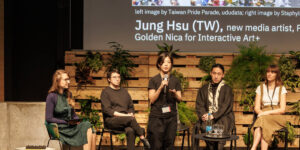
Morning Inspirations: Creative Resilience for a Planet B
Sigrid Bürstmayr (AT), Rashin Fahandej (US/IR), Adrian van Hooydonk (NL), Yuima Nakazato (JP), Jung Hsu (TW) & Natalia Rivera (CO), Marcus Neustetter (ZA), Tom Lamberty (DE)
In der Morning Inspirations Session diskutieren Mitglieder des Ars Electronica Futurelab, seine Partner*innen und die künstlerische Community gemeinsam mit dem Publikum über „Kreative Resilienz für einen Planet B“: Wie können Kreativität, Kunst und Technologie die Gesellschaft angesichts vieler Krisen unterstützen? Wie kann Resilienz von einer persönlichen Verantwortung in ein gesellschaftliches Phänomen verwandelt werden?
